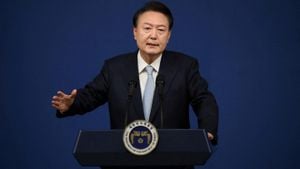The backdrop of the conflict between Russia and Ukraine has not only reshaped Europe’s geopolitical dynamics, but it has also ignited debates about military support, sanctions, and the future of Ukraine's relationship with the European Union. The recent visit of high-ranking European dignitaries to Kyiv has shed light on the EU’s commitments and its ability to fulfill them amid rising tensions and expectations.
The European Union's efforts to strengthen ties with Ukraine were demonstrated during the visit by Kaja Kallas, the EU’s top diplomat, alongside European Commissioner for Enlargement Marta Kos and European Council President António Costa. This visit marked the inaugural day of the new European Commission’s mandate and was characterized by Kallas emphasizing the EU's duty to deliver on the military aid it promised to Ukraine. Kallas addressed journalists at NATO headquarters after returning from Kyiv, calling for the EU to step up its game: "They had very specific requests, as always, as well as frustration... so, we really need to work on fulfilling all these promises to make them a reality."
This statement reflects the growing impatience among Ukrainian officials who feel the urgency of their situation is not being met with speedier responses from their European partners. The war, now well over two years old, continues to impose severe human, economic, and infrastructural costs on Ukraine. The strength of Ukraine’s military is key to its defense against Russian aggression, and with winter fast approaching, adequate supplies could make the difference between survival and defeat.
Kallas went on to highlight the issue of sanctioning Russia and the importance of leveraging the European Peace Facility to facilitate the transition of military support. This facility, which aims to reimburse EU member states for military aid provided to Ukraine, currently faces significant hurdles. A staggering €6.5 billion remains frozen due to Hungary’s veto, delivering yet another blow to the speed at which the EU can provide this assistance.
Meanwhile, discussions around military supply chains and air defense capabilities have taken center stage, especially after NATO Secretary General Jens Stoltenberg affirmed at the recent NATO summit the alliance's commitment to providing Ukraine with air defense systems. The urgency surrounding air defenses has intensified, particularly as Russia has increasingly targeted Ukraine’s infrastructure with missile strikes.
On the ground, Ukrainian President Volodymyr Zelensky has made it unequivocal; he asserts the country's immediate needs for arms and military support are non-negotiable. Amidst his talks with visiting EU leaders, Zelensky reiterated the necessity of securing NATO's guarantee on military support before any potential peace talks with Russia can commence. Zelensky firmly stated, "Before we talk about negotiations, we need to fortify our defenses."
The interplay between military aid and diplomatic discussions has never been more pronounced. Zelensky's administration is aware of the delicate balance between negotiating peace and fortifying positions against Russia’s military advances. The president has made it clear; ensuring military readiness is absolutely pivotal before any discussions can proceed. His comments resonate particularly well considering the recent trends where Russia has shown no inclination toward ceasing hostilities.
Widespread acknowledgment among European nations indicates support for Ukraine transcends being simply humanitarian aid; it is increasingly viewed as ensuring regional stability and security. The conflict has altered the security calculus for nations across Europe, igniting discussions about defense spending, military preparedness, and bilateral security agreements.
Simultaneously, the civilian populace continues to bear the brunt of conflicts, leading to damage not only on the battlefield but also within civilian environments. Areas like Kharkiv and Bakhmut have seen both strategic military importance and monumental civilian suffering. This has sparked calls among Ukrainian officials to widen sanctions on Russian entities and individuals. Reports indicate the necessity for tighter sanctions to cripple Russia's ability to maintain its military supply chains.
Reflecting on these developments, experts suggest the EU must deliver on its promises to Ukraine swiftly and meaningfully. The political will among member states has demonstrated certain reluctance to expedite the process, often leading to delays and unmet expectations.
The current dialogue continues to pivot around tough negotiations among EU members, emphasising the need for collective action on military aid. There is significant backing for making aid conditional to mitigate risks associated with previous shortfalls and to solidify Ukraine's steady ascent toward EU membership. This goal is perceived as not only supporting Ukraine but also reinforcing EU interests against external threats.
Failure to act decisively could embolden adversaries and undermine the stability of Eastern Europe, leading to long-term ramifications for the security of the European Union itself. The messages within the EU and NATO circles have become clear: the need for enhanced military capacity is pressing, and the commitment to Ukraine’s sovereignty is non-negotiable.
Still, as discussions favorably lean toward military readiness, what remains vague is whether European nations will confront potential domestic challenges associated with military expansions and reforms due to increasing public scrutiny and economic burdens across the continent. While the stakes seem high, one thing stands out; the urgency for action has never been clearer.
The EU is at a crossroads, as its commitment to Ukraine is not merely political rhetoric; it has become pivotal for maintaining the societal fabric of Europe amid conflict. The weight of this situation is pulling leaders to recognize their roles much more than before. What lies on the horizon as Europe seeks to navigate these tumultuous waters remains to be seen, but one thing is for sure – Ukraine stands increasingly at the forefront of this continental dialogue.



